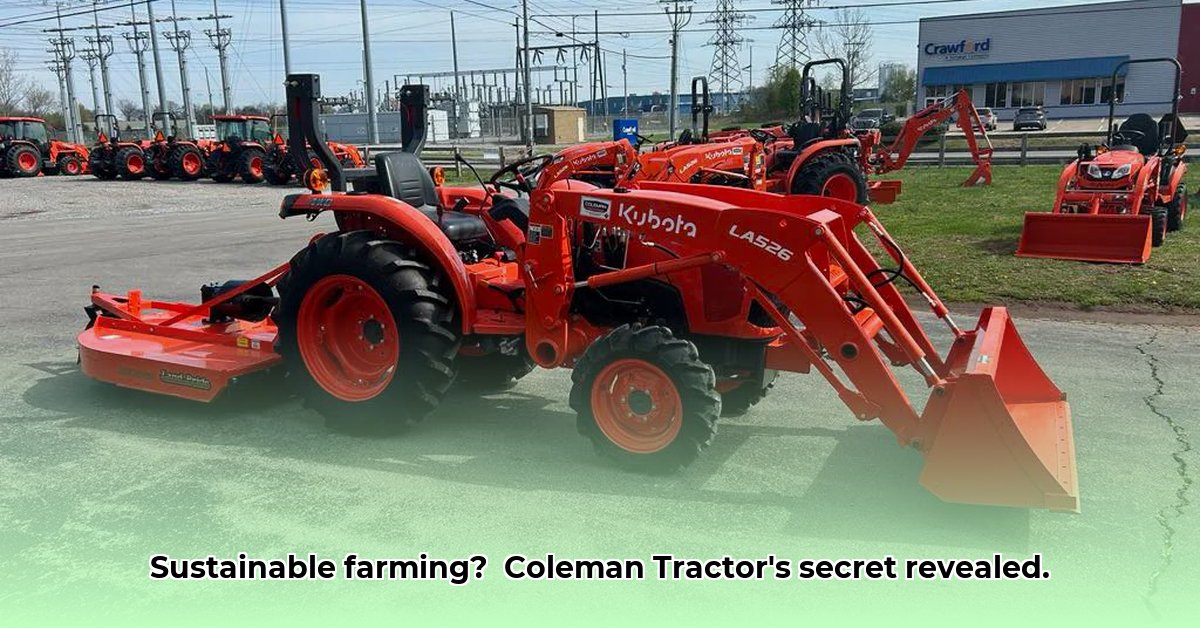
The Tennessee sun beat down on Jedidiah’s weathered face as he guided his Kubota tractor across his family’s field. The familiar rumble of the engine, a soundtrack to generations of farming, is increasingly accompanied by a different kind of hum—a growing concern about the environmental impact of modern agriculture. This is the story of Coleman Tractor in White House, Tennessee, and its role in navigating this complex landscape. It's a story of durable machinery, market dominance, and the crucial, yet often overlooked, question of sustainability. For more information on Kubota pricing, see Kubota tractor pricing.
The Tennessee Farm Landscape: A Balancing Act
The vibrant green and gold of Tennessee's farmland belie a challenge: balancing the need for efficient food production with environmental responsibility. Coleman Tractor, a major player in the region, primarily sells and services Kubota equipment—a brand synonymous with reliability and longevity. This dominance reflects a market preference for durable machinery, a seemingly positive aspect of sustainability. But what about the bigger picture? Precise data on the environmental impact of this equipment—fuel efficiency, greenhouse gas emissions, overall lifespan—is, unfortunately, scarce. It’s like trying to understand the health of a patient without vital signs.
How sustainable is this model of farming? We still lack the comprehensive data necessary to answer definitively. For example, precise comparisons of Kubota’s market share with other brands, or detailed fuel consumption figures over the lifetime of a machine, are lacking. This lack of information hampers our ability to adequately assess the long-term sustainability of current agricultural practices in Tennessee.
Durability: A Double-Edged Sword
The longevity of Kubota tractors, a cornerstone of Coleman Tractor's success, is undeniably a step towards sustainability. Replacing machinery less often directly reduces waste from manufacturing and transportation. However, this is only one piece of a much larger puzzle. The long-term fuel consumption of these durable machines, and the potential for more energy-efficient alternatives, remain largely unknown. We need a broader perspective – one that looks beyond initial purchase price to encompass the complete environmental footprint of a tractor throughout its operational life.
Unveiling the Path Forward: Actionable Steps for a Greener Future
Building a sustainable agricultural future necessitates collaborative action from all stakeholders. Here are some concrete actions that can drive positive change:
For Coleman Tractor White House:
- Data-Driven Decisions: Conduct thorough customer surveys to understand farmers’ sustainability concerns and equipment priorities. This data will inform decisions about future equipment offerings and services. (Efficacy: Improved product alignment with farmer needs).
- Life-Cycle Assessments: Invest in measuring the fuel efficiency and greenhouse gas emissions of the tractors they sell throughout their entire lifespan. This transparently assesses the environmental impact of their product line. (Efficacy: Increased transparency and informed decision-making)
For Tennessee Farmers:
- Holistic Cost-Benefit Analysis: Farmers should carefully consider long-term fuel costs, potential repairs, and equipment lifespan when making purchasing decisions. This goes beyond the initial investment. (Efficacy: Reduced long-term costs and environmental impact)
- Accessing Incentives: Actively explore government grants and subsidies designed to support the adoption of sustainable farming practices and equipment. (Efficacy: Increased accessibility to sustainable solutions)
For the Tennessee State Government:
- Investing in Research: Fund research into sustainable agricultural equipment, alternative fuels, and innovative farming techniques. (Efficacy: Fostering innovation and technology adoption)
- Incentivizing Sustainability: Implement incentive programs to reward farmers who actively adopt and maintain environmentally friendly practices. (Efficacy: Increased adoption of sustainable practices)
For Equipment Manufacturers (like Kubota):
- Sustainability Leadership: Prioritize the research, development, and marketing of genuinely sustainable agricultural equipment. This commitment should be clearly communicated. (Efficacy: Market-driven innovation towards greener solutions)
- Collaborative Partnerships: Foster strong relationships with researchers and farmers to ensure innovations are both effective and practical. (Efficacy: Improved alignment of technology with farmer needs)
A Collective Effort: Towards a Sustainable Future
Coleman Tractor holds a key position within Tennessee's farming community. By embracing data-driven decision-making, prioritizing sustainability, and fostering collaboration, they, along with Tennessee farmers and the state government, can build a more environmentally friendly and economically resilient agricultural future. The journey requires a collective commitment to responsible land stewardship and wise resource management. The future of Tennessee's agricultural landscape depends on it. Investing in data collection and analysis is the first crucial step in this collective journey.
How to Reduce Carbon Footprint of Farming Equipment in Tennessee
Key Takeaways:
- Tennessee farmers face a significant challenge in reducing the environmental impact of their equipment.
- Data limitations currently hinder a comprehensive understanding of the problem and effective solutions.
- Improved data collection and collaboration are essential for progress.
- Sustainable practices, like precision farming and soil health management, can significantly reduce emissions.
- Exploring alternative fuels and technologies offers long-term solutions.